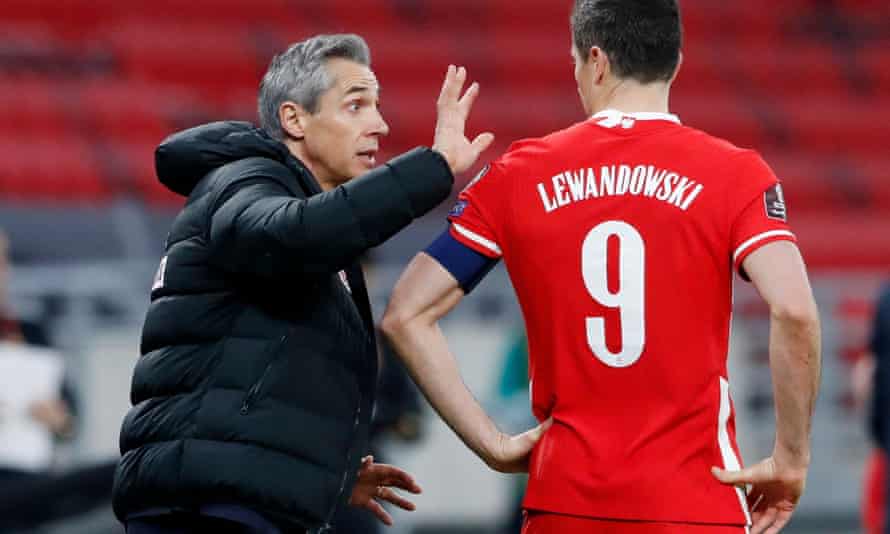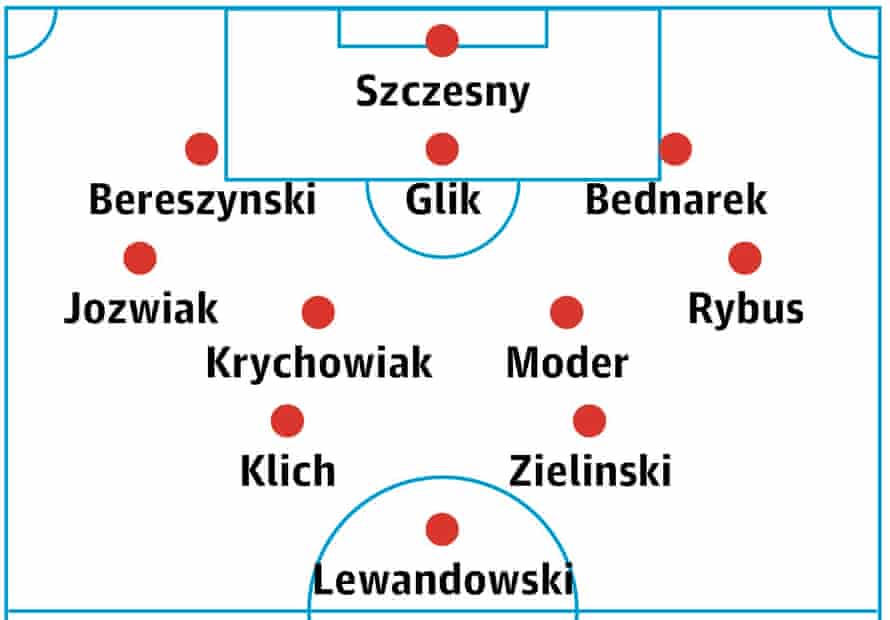This article is part of the Guardian’s Euro 2020 Experts’ Network, a cooperation between some of the best media organisations from the 24 countries who qualified. theguardian.com is running previews from two countries each day in the run-up to the tournament kicking off on 11 June.
Qualifying for Euro 2020 did not present Poland with many problems. They were the favourites to win their group and did so handsomely, six points ahead of Austria. Results hid the fact that they did not play very well. They suffered in many games and the playing style of the team under Jerzy Brzeczek was becoming a problem for the fans and also the Polish FA president, Zbigniew Boniek.
At the start of this year Brzeczek was dismissed and replaced by Paulo Sousa. The Portuguese coach, who has managed Swansea, Fiorentina and Bordeaux among other clubs, initially brought a lot of enthusiasm to the table. At the very first press conference, he massaged the Polish ego by talking about the country’s great traditions, and even Pope John Paul II. He also talked animatedly about his plans for the team.
On the pitch, however, the start of his tenure was far from perfect. The first three World Cup qualifiers saw a draw with Hungary, a defeat against England and a win over Andorra with performances that did not lead to much optimism. Sousa, however, has not changed his attitude or his beliefs – he is convinced he can get the best out of this generation of players.
The main change, apart from the positive mentality he is trying to instil, has been tactical. Raised in the excellent Portuguese school of coaches, then polished in an Italian workshop, he uses a hybrid formation that is very flexible. Poland now play with three defenders when pushing forward, switching to four or five when they are without the ball .
Sousa requires his players to be in excellent physical condition to fulfil one of the cornerstones of his tactics, which is to be dominant and put a lot of pressure on the opponent, making sure they do not have the space to play their game. He likes to play with two forwards to get the best out of the team’s talisman, Robert Lewandowski.
“The absolutely basic element of our game in the attack must be to feed Lewandowski and the other attackers,” he says. “We cannot afford to waste this potential. Poland has not only the best ‘sniper’ in the world, but generally a very high level of attackers to choose from.” Napoli’s Piotr Zielinski will be key in the creative department, especially as Arkadiusz Milik was ruled out of the Euros on Monday.
“We believe that we can achieve something unique at the Euros,” Sousa says. “We can do that by using the experience of our players who play in some of the best leagues in Europe. We have to believe in ourselves, to think that we can succeed.”
The coach
Paulo Sousa was only a young boy when his father had a serious car accident which put him in a coma. Sousa and his mother made pilgrimages to Fatima, a famous centre of devotion in Portugal, praying for his father’s health. The family’s prayers were answered and his father recovered; the young Sousa had learned that faith worked. As a professional, though, he is not superstitious, believing instead in hard work and good communication. For Sousa, it is important to first focus on the human, then on the player. He tells players how important they are in his plans and that he counts on them (and the fact that he speaks four languages fluently probably helps).

Icon
Robert Lewandowski. The Bayern Munich striker has gone from strength to strength and the strange, pandemic-interrupted 2019-20 season was arguably the best of them all as he guided the Bavarians to an impressive treble and was named Fifa’s player of the year for the first time, ahead of Lionel Messi and Cristiano Ronaldo. And it is all down to hard work and determination to keep improving which is a factor in his home life too: the 32-year-old is married to Anna, who is a former world karate champion.
Happy for a year’s delay
Kamil Piatkowski is in a much better place than he was 12 months ago. In the summer of 2020 he was a little-known defender at mid-table Polish side Rakow Czestochowa. Now he is considered one of the most talented centre-backs of his generation. The defender, who will turn 21 during the Euros, has agreed to join RB Leipzig from next season and may have his international breakthrough this summer.
Potential lineup

What the fans sing
Polish fans are not great singers in the stands and they have yet to adopt a particular song. The one that has made the biggest impact is probably Maryla Rodowicz’s Futbol from 1974, when Poland finished third at the World Cup. There have been several unsuccessful attempts to recreate that popularity in recent years.
What the fans say
“Szansa! Aj, Jezus Maria!” – Chance! Ah, Jesus Maria! – used all over the internet when Poland miss an opportunity to score. Coined by the legendary commentator Dariusz Szpakowaki during a game against England in 1993.
“Mecz Otwarcia. Mecz o wszystko. Mecz o honor” – Opening match. Match for everything. Match for honour – after disappointing performances at recent tournaments, all eyes are on the first game against Slovakia.
“Nic sie nie stałlo, Polacy nic sie nie stalo” – Nothing happened, Poles, nothing happened – heard after Poland concede a goal.
Pandemic hero/villain
Lewandowski is well known for his charity work but during the pandemic he outdid himself. He donated €1m to support 21 hospitals, another €250,000 to a children’s health centre in Warsaw and to fund an ambulance, and 5,000 staff meals to a hospital in the capital. Also, 10% of all sales of his RL9-branded coffee went to support the elderly. He is an absolute hero on and off the pitch.
Tomasz Wlodarczyk writes for Meczyki.
Follow him on Twitter @wlodar85.
For a player profile on Piotr Zielinski click here.
from Football | The Guardian https://ift.tt/2Sa1AVm
via IFTTT

No Comment